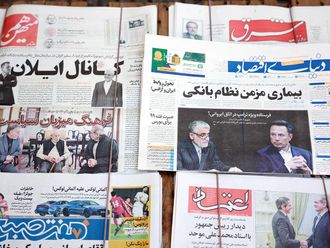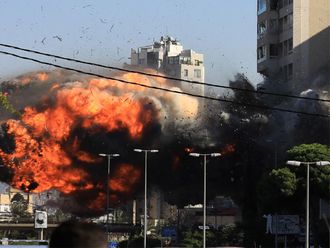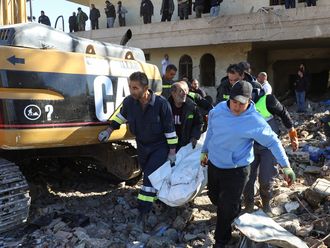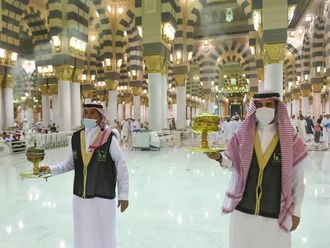TEHRANAs Syria’s conflict grinds bloodily on, Iran threw its diplomatic muscle this week into trying to save its Damascus ally - but Western observers said the effort was likely to worsen the crisis.
“Distrust between Iran and the West means Iran’s attempt at a parallel diplomatic track simply exacerbates the divisions between those, like Russia and Iran, who want (President Bashar Al Assad to stay and the rest of the world who see that his violent actions against his own people mean that this is simply untenable,” one Western diplomat said.
Iran sent two top envoys to several countries in the region this week - including to Syria, where Assad was told Tehran would never let its “axis of resistance” with him fold.
It also hosted a conference of like-minded nations in Tehran calling for a Syria ceasefire.
The pro-Damascus initiatives launched by Iran compete head-on with a Western-backed diplomatic track that is tilted in favour of Syria’s opposition.
US Secretary of State Hillary Clinton added momentum to that second track yesterrday by holding talks in Istanbul with Turkey’s leaders and Syrian opposition figures.
The duelling diplomacy has left the quest for peace in Syria fragmented and impotent, analysts say.
In the meantime, the body count in Syria, where savage fighting is raging in the commercial hub of Aleppo, has surpassed 21,000 since the insurgency started in March 2011.
Iran is committed to ensuring the Syrian regime’s survival.
As Saeed Jalili, a top aide to Iran’s supreme leader Ayatollah Ali Khamenei, told Al Assad when he flew to Damascus to see him on Tuesday: “Iran will never allow the axis of resistance - of which Syria is an essential pillar - to break.”
That “axis” forms a Shiite-run crescent stretching from Tehran to the Mediterranean. It is headed by the Islamic Republic of Iran and includes Al ssad’s government and Hezbollah in Lebanon, all of which are unified by anti-Israeli policies.
Tehran’s support for Syria got complicated last week, when rebels captured 48 Iranians in Damascus and accused them of being Iranian Revolutionary Guards on a “reconnaissance mission.”
Tehran eventually acknowledged that the men included “retired” Revolutionary Guards, but insisted they were in the Syrian capital on a religious pilgrimage, not on military duty, and demanded their immediate release.
Iran denies US accusations it has military personnel in Syria to help Al Assad’s forces against the rebels.
On Thursday, Tehran hosted a conference on Syria that appealed for a ceasefire and dialogue between the Syrian regime and opposition, but Iranian Foreign Minister Ali Akbar Salehi said the aim of such talks would be to further political reforms Assad has promised, not the ouster of Syria’s leader.
The conference gathered 29 countries, including Russia, China, Afghanistan, Pakistan, Cuba, Iraq and Venezuela, but most were represented at the relatively low level of ambassadors, not foreign ministers as had been announced.
Turkey, the US and its Western allies, and Gulf Arab states - all accused by Tehran of arming Syria’s rebels - were excluded.
That mirrored the same exclusion of Iran demanded by the United States in a previous, unsuccessful diplomatic thrust despite efforts to include it by Kofi Annan, the UN-Arab League envoy on Syria who said last week he was stepping down in frustration at UN Security Council infighting on the conflict.
“Rather than holding diplomatic conferences with a self-selecting attendance list, Iran could more meaningfully contribute to a solution by withdrawing its military advisors and support for the Assad government and instead clearly back UN attempts to broker solutions,” the Western diplomat said.
rmb/al
AFP












